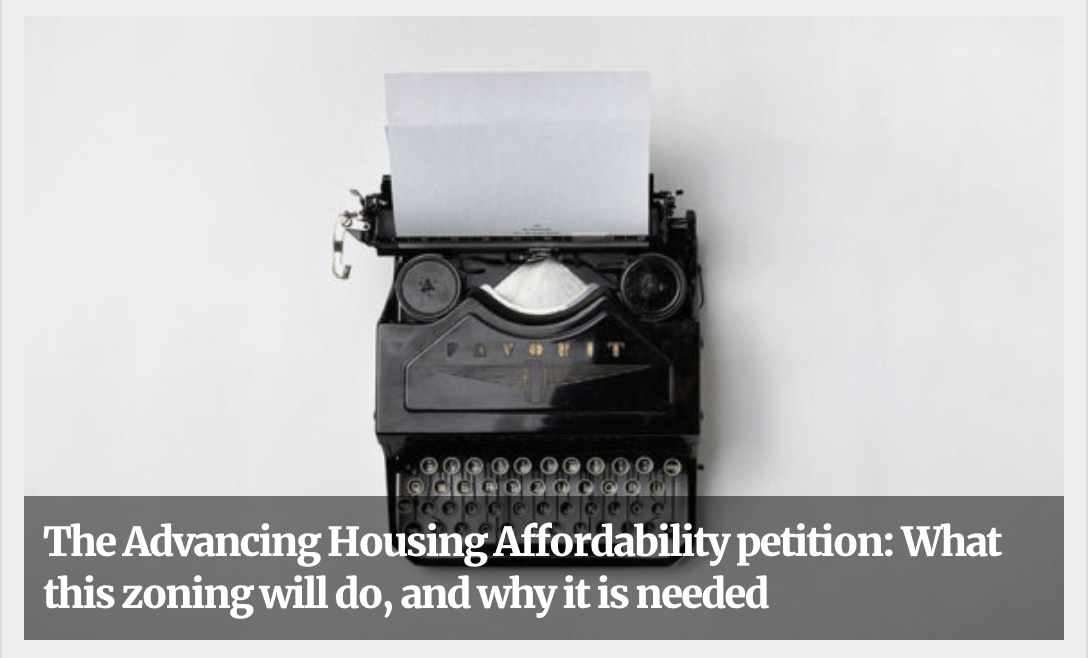|
Fritz Donovan, a member of the group who wrote the Advancing Housing Affordability (AHA) Zoning Petition published this Op Ed on September 12, 2021, in Cambridge Day addressing how this petition was written, what it will do , and how important it is for the City as we go forward. Also please read the article there and support your local newspapers. His Op Ed points out that: "This spring and summer, a group of concerned residents from a wide range of backgrounds and skills met weekly to discuss Cambridge housing problems and what can be improved through zoning. This resulting citizens’ petition to advance housing affordability – and called the Advancing Housing Affordability Petition – offers an important avenue for change while maintaining essential Cambridge features that must be preserved in this era of climate change and population increases. These changes will provide more affordable housing in Cambridge while solving many problems we face.
A fundamental contributor to Cambridge’s current housing, transportation, parking and infrastructure needs is the addition of thousands of corporate and institutional employees and students with no requirement to plan for housing. This petition proposes a citywide overlay requiring all organizations of more than 100 people to provide area plans with annual reporting for 85 percent of their full-time employees, students and affiliates by 2040. A key element would be assistance to low- and middle-income employees to build equity by buying rather than renting. Another factor in the housing shortage is the current restriction that all residents in single-family or two-family zone homes must be from the same one or two families. Many such homes are now occupied by just a single family member, forcing owners to leave hundreds of rooms empty throughout Cambridge or violate the law by renting to unauthorized tenants to support the home. The AHA petition proposes to modify single- and two-family zoning restrictions to allow creation of additional units within the shells of single-family and two-family homes, with relatively modest changes such as doors and windows in the rear or on side walls near the rear. These modifications will preserve existing sustainable residences and legalize the illegal apartments that now exist. Owners who add three or more units must meet city affordability housing guidelines prorated to the number of units, with a bonus to encourage adding affordable units. To address climate change, this petition also mandates that all new residential off-street outdoor parking spaces be exclusively of water-permeable surfaces that absorb rain. Why these zoning changes are needed The latest U.S. Census reports that total residential housing units in Cambridge increased 14 percent between 2010 and 2020, to 54,000 units from 47,000, while occupied units increased more than 12 percent and vacancies increased 33 percent. More is definitely needed; Cambridge must look holistically at its entire housing situation and identify solutions to reduce vacancies and encourage other improvements. Our large employers and institutions must work with residents and officials to create area-wide housing, transportation, parking and infrastructure plans addressing critical concerns facing the city. This petition’s requirement for annual reporting will ensure that goals are established and met, with the city itself reporting to the City Council and all others reporting to the Planning Board. Collaboration among employers and area-wide planning involving all major employers will be critical to addressing climate change as well. In summary, this petition will modify Cambridge zoning for exclusively single- and two-family housing in a way that will not escalate housing costs or property values and will not destroy the city’s rich array of sustainable historic housing. It seeks to prevent the current environmental problem of tearing down existing stock to build larger, more expensive housing and to preserve Cambridge’s diverse neighborhoods and their broad array of architecturally beautiful and historic housing. Encouraging the adapting of single-family and multifamily homes will create a new supply of studios, one-bedroom and smaller two-bedroom units, as well as cooperatives with shared living spaces. These will enable individuals and households seeking lower rents to move in, increasing the supply of existing various unit sizes and helping reduce average rents citywide. The larger residences they move out of then become available for new families. In addition, by encouraging large employers – and city government – to take an active role in planning the housing of their employees, and to help their low- and middle-income employees build equity where they are living, Cambridge can take a major step toward reducing its current housing shortage. Cambridge is a wealthy city with a progressive citizenry committed to maintaining its historic diversity and adding more affordable housing. But the recent Cambridge Community Foundation report states less than 15 percent of our current housing is income-restricted affordable housing accessible to families earning below 80 percent of Cambridge‘s area median income of $98,100; Cambridge is therefore losing teachers, firefighters, artists, police, nurses, nonprofit staff, small-business owners, senior citizens and, increasingly, the long-standing African American families who have anchored our community for generations. Sadly, tax-funded Affordable Housing Overlay costs have risen to more than $900,000 per unit, as quoted recently for Jefferson Park by the Affordable Housing Trust."
0 Comments
Your comment will be posted after it is approved.
Leave a Reply. |
